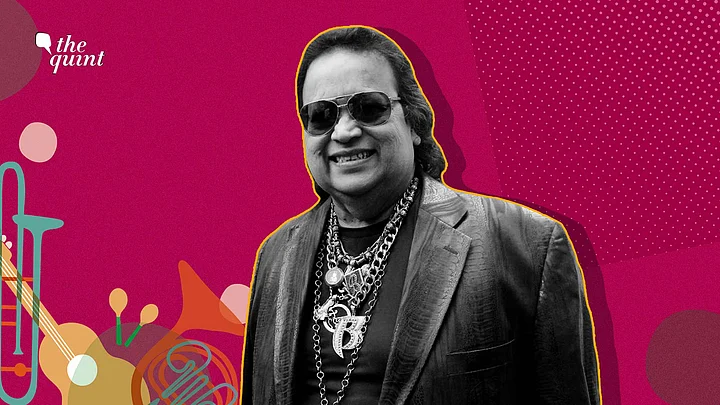Some five years ago, there he was at the New Delhi airport, waiting at the conveyor belt for his Louis Vuitton suitcases. His canary yellow outfit and kilos of gold jewellery drew the usual amused nudge-nudge-wink-winks. On the other hand, the group of porters swarmed him for autographs, and one of them even badgered him to sing.
Without a pause, he started on his ballad Chalte Chalte Mere Yeh Geet Yaad Rakhna… Kabhi Alvida Na Kehna (Chalte Chalte, 1976), only to be interrupted for a brief rendition of an alternative which he sang out loud sportingly. The track, of course, was, Zindagi Mera Gaana..Main Isi ka Deewana..I’m a Disco Dancer....
That chart-smasher followed him everywhere, be it at home or in Russia, where that dance-movie had gained a cult following. Neither over or underwhelmed by that airport demand, he smiled widely and the porters carried his bags to the SUV awaiting him.
Alokesh Lahiri, aka Bappi, the only child of classical musician parents, was born in Jalpaiguri, West Bengal, and it is lore that he could play the tabla expertly at the age of three. Ashok Kumar and Kishore Kumar were his maternal uncles. Now who was to think at the age of 25, he would become the monarch of disco and bling with the Mithun Chakraborty strobe-fest Disco Dancer – its music score as remote from even the semi-classical as the earth is from the moon.
Disco, synthesiser-stacked Bollywood music has always been closely associated with Bappi Lahiri -- largely because he took over the genre, without a blush. Before him RD Burman’s Aaja Aaja Main Hoon Pyaar Tera... (Teesri Manzil, 1966) had the boogie riffs of the Beatles' I Wanna Hold Your Hand...
On the heels of the worldwide craze for the John Travolta zinger Saturday Night Fever (1977), Feroz Khan had talent-scouted the sister-and-brother team of Nazia and Zoheb of Pakistan. Followed that imperishable track by Nazia Hassan, Aap Jaisa Koi Meri Zindagi Mein Aaye... picturised on Zeenat Aman in Khan’s Qurbani (1980). The siblings, next, belted out the best-seller album Disco Deewane (1981).
The hour for a takeover of pop disco beats was just around the corner. And Bappi da grabbed it with his compositions and vocals for a triptych of films in collaboration with director B Subhash: Disco Dancer (1982), Kasam Paida Karnewale Ki (1984) and Dance Dance (1987).
Pilloried throughout his career for plagiarism – of lifting as many as 22 tunes from varied sources including Ottowan, Pink Floyd, UB40, Mory Kante, Osibisa, Cheb Khaled, The Buggles, The 3 Degrees, Eruption and Nusrat Fateh Ali Khan – he remained impervious to criticism. After all a hit is a hit, is the Bollywood mantra, be it in the departments of stories, music, choreography and more.
Quite firmly, in fact, he had stated in one of his TV interviews, “It’s a tradition. Salil Chowdhury was inspired by Mozart. SD Burman and especially RD Burman are guilty of this charge too. The thing is a small piece is taken and recomposed entirely. In any case, take Disco Dancer. Mithun was dancing like John Travolta and Michael Jackson, so I had to take those beats.”
As the disco wave waned, Bappi da opted for bouncy desi rhythms, especially for the Hindi films produced in the southern studios such as Himmatwala (1983), Tohfa (1984) and Maqsad (1984) mainly starring Jeetendra, Sridevi and Jaya Prada. Success also guaranteed offers from top line projects featuring Amitabh Bachchan.
That he could go the traditional way of melodious music, if need be, was cavalierly ignored. Examples: the songs of Zakhmee (1975), Toote Khilone (1978) and Saaheb (1985).
With the shifts in tastes and fads, Bappi da’s market dwindled. Yet, he wasn’t to be stymied. He claimed that he had recorded two tracks with Lady Gaga and was in collaboration with Akon. Moreover in 2003, he won a copyright case against Dr Dre who for his album Addictive had plagiarised the song Kaliyon Ka Chaman... (Jyoti, 1981).
Ever-smiling, ever flamboyantly dressed, Bappi da continued to dream big. He aspired for a Hollywood acting career for his son Bappa. He directed a documentary titled Slumstars and announced that he would shortly direct a feature film titled Ek Adhura Sangeet. In addition, he encouraged his wife Chitran to produce the Bengali film directed by Buddhadev Das Gupta, Lal Darja, which won the Best National Film Award in 1997.
The singer-composer dabbled in politics for a bit, and was successful in getting a ticket to contest the Lok Sabha elections in 2014 from Srerampur on a BJP ticket. However, he lost to Kalyan Banerjee of AITC, and with that he closed his ambitions in politics.
Making a comeback with the chartbuster Ooh La La... for The Dirty Picture (2011), his last assignment was the Tiger Shroff actioner Baaghi 3 (2020).
Yet, with his sudden departure today, admit it, which song of his would you turn to right away? Some would say Kabhi Alvida Na Kehna.... but the New Delhi airport’s porters would surely ask for a request of, I’m a Disco Dancer... and one of the lines of its lyrics goes, Doston Meri Yeh Zindagi Geeton Ki Amaanat Hai...Main Isi Liye Paida Hua Hoon... (Friends, my life belongs to music…I was born only to sing.)
(At The Quint, we question everything. Play an active role in shaping our journalism by becoming a member today.)
